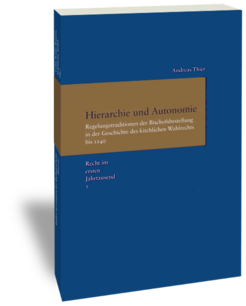Hierarchie und Autonomie
Regelungstraditionen der Bischofsbestellung in der Geschichte des kirchlichen Wahlrechts bis 1140

[Hierarchy and Autonomy. Regulatory Traditions of Episcopal Appointments in the History of Ecclesiastical Voting Rights until 1140]
Andreas Thier
Studien zur europäischen Rechtsgeschichte 257
Recht im ersten Jahrtausend 1
Frankfurt am Main: Klostermann 2011. XVII, 573 p.
ISSN 1610-6040
ISBN 978-3-465-04113-9
The medieval office of bishop combined political rule and ecclesiastical powers. As a result, the selection and appointment of bishops was one of the most important issues in religious as well as secular norm generation. Long-standing traditions relating to episcopal appointments had developed since Late Antiquity. These combined visions of hierarchical order and autonomous decision-making with conceptions of elections as orderly and rule-governed procedures. These developments are the subject of this book. The ecclesiology of Cyprian provides the starting point, as his ideas and concepts informed conciliar and papal norm generation. But other elements gathered influence in the transition from Late Antiquity to the Middle Ages, such the hierarchical ties of episcopal appointments and the consent of those affected. These Late Antique traditions were effective until the Gregorian Reforms and the Investiture Controversy. The collections of canon law, which guaranteed the constant presence of Late Antique traditions, were an important precondition of such developments, but they were simultaneously a site of norm generation. As the collections were rearranged and systematically ordered, new approaches to regulation emerged from the texts they contained. This is a prime example of the deep interplay between textuality and law in the context of medieval religious culture.
